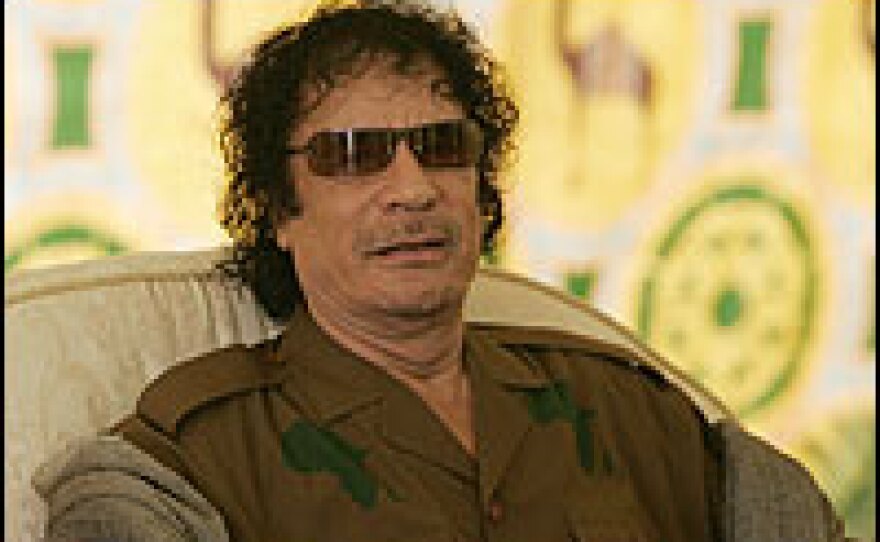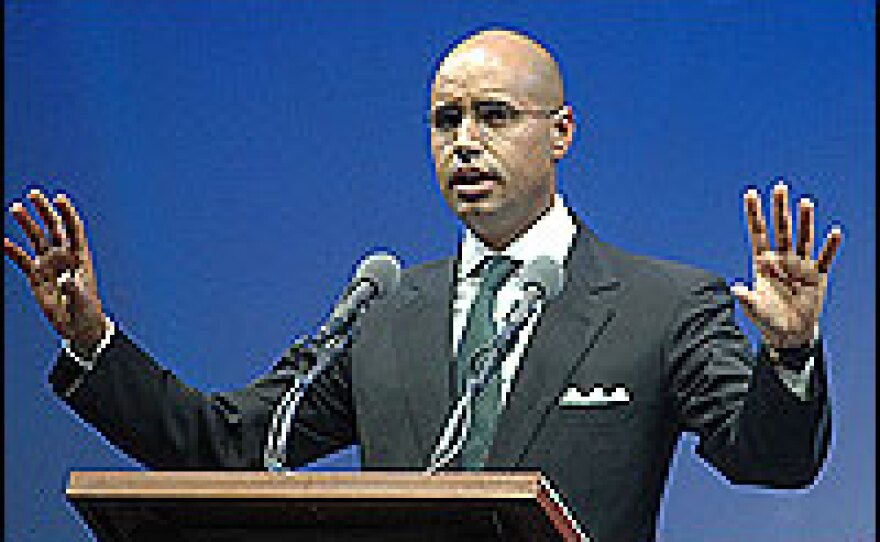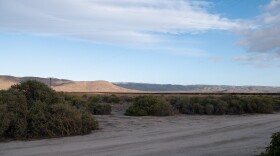

There have been dramatic changes by the government of Libya in recent years.
After renouncing terrorism and handing over the prime suspect in the Lockerbie bombing, the Tripoli government handed over its nuclear weapons program to the United States in 2003. The moves helped end decades of international isolation.
Internally, however, change in Libya has come much more slowly. There is talk of reform — but after 38 years in power, the regime of Col. Moammar Gadhafi appears ill-equipped or unwilling to open up completely to the outside world.
Things to Come
A Canadian-built CRJ 900 passenger jet, complete with a Canadian crew to train the plane's new owners, is the latest addition to Libyan Arab Airlines.
Capt. Salah El Lamushi said it was the first new plane the airline had purchased since 1980. More than a dozen old planes lie discarded in the grass next to the tarmac, the result of decades of sanctions that prevented Libya from importing new planes or spare parts, Libyan officials said.
"Certainly, once things start to go better, we hope they will never go back to the way they were before," Lamushi said, of whether the new plane is a symbol of things to come in Libya.
Applying the Revolution's Rhethoric
Four years after United Nations sanctions were lifted, Libya appears to be opening up very slowly.
On Sept.1, the government organized parades to celebrate the 38th year of the revolution—the bloodless military coup which ousted the Libyan monarchy and swept then-Capt. Gadhafi to power.
Juma Abdul Kher, a Libyan government spokesman, insists that Gadhafi's revolution is still relevant.
"The revolution is a movement," Kher said. "And the movement is dynamic- - dynamic in its right direction. As long as it serves the masses, then it's good," Kher said.
Gadhafi's face still decorates billboards across a country that often appears stuck in the 1970s. Most of the buildings in Libya are white and green—the colors of Gadhafi's Green Book. Issued in 1973, this utopian manifesto calls for, among other things, the abolishment of the "dictatorship of the private sector."
But Youssuf Sawani, the director of the Gadhafi Foundation, is trying to usher in a new era of pragmatism in Libya.
"We had been, for some time, under the effect of a very dogmatic interpretation of the Green Book, wherein everything has to be tied to this dogmatic interpretation," Sawani said.
Sawani's organization is led by one of Gadhafi's sons, Saif al-Islam. In a country where people are terrified of publicly criticizing the regime, Sawani openly challenges the country's ruling elite, which al-Islam once labeled a mafia.
"We have people who are stakeholders ... within the political elite," Sawani said. "[They] are still tied to the dogmatic interpretation and dogmatic ideas. And they never realize that the world around them is changing."
New Checks on an Opaque Government
Last month, the Gadhafi Foundation launched two new newspapers and a television channel, bringing an end to a decades-long monopoly by Libyan State TV.
Fatmah Abu Sheyewa works at the new television station.
"Libya now is going ... to change its policy," Sheyewa said. "[So it will] look like the other countries — the developed countries."
She says one goal of the television station is to address inefficiency and corruption in the Libyan government. Those issues, she said, were not discussed before.
The Libyan state apparatus is notoriously opaque. For example, there are no government phone directories. So to communicate with Libyan decision-makers, Western diplomats sometimes call other embassies in Tripoli in order to get the personal cell phone numbers of top officials.
But despite an ineffective bureaucracy, Libya has the highest per capita income in Africa, thanks to oil exports. Libya's relatively small population enjoys big government subsidies on everything from housing to cars, food and fuel.
Khalid Bazzelya, of the World Center for the Study of the Green Book, warned that Libyans can't rely on oil revenues forever.
"If everything is subsidized by the government, then people will become very lazy," Bazzelya said. "We know that."
Reviving Entrepreneurship
Sawani is pushing for diversification of the oil-dominated economy. He concedes, though, that it will take time to win back the confidence of Libyan entrepreneurs.
"Between the years 1978 and, let me say, probably 1995, there was no room for [the] private sector," Sawani said. "There was no room for entrepreneurialship. And we had to fight to win those back."
Gadhafi has periodically targeted the private sector with waves of property confiscation. At one point, he banned all privately owned restaurants, law firms and the entire retail sector.
Local businessman Khalid Ezaydi says that the government has removed some onerous restrictions in recent years
"It's easier than before — because before a lot of bureaucracy, a lot of documentation, you will need," Ezaydi said. "Now the weather is changing, and I can establish a company in [a] fast and easy way."
Since Libya renounced its support of terrorism, the leaders of France and Britain have traveled to the country to meet with Gadhafi. They have announced multimillion-dollar trade deals.
In the lobby of Tripoli's $400-a-night Corinthia Hotel, some potential foreign investors curse Libya's antiquated banking system and complex visa restrictions. They say that the country has years to go before it can deal with the rest of the world in international trade.
Outside the hotel, signs advertise the future construction of flashy glass-and-steel towers, the kind that have sprouted up across the oil-rich Persian Gulf.
Al-Islam, Gadhafi's son, is taking the lead in efforts to modernize his country. In part, because he's positioning himself to be Libya's next leader, observers said.
But the scope and pace of his proposed reforms still rest in the hands of one man.
Copyright 2022 NPR. To see more, visit https://www.npr.org. 9(MDAzMjM2NDYzMDEyMzc1Njk5NjAxNzY3OQ001))







